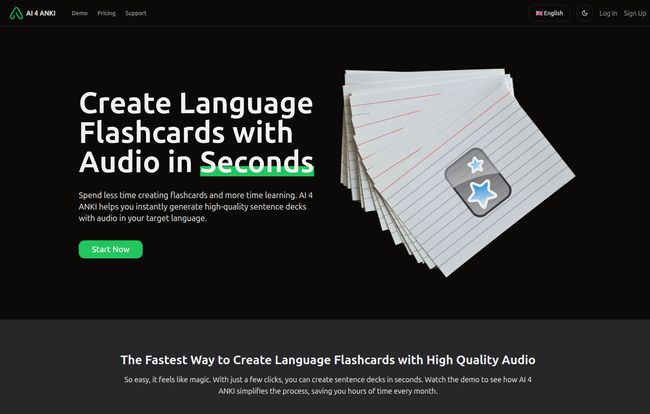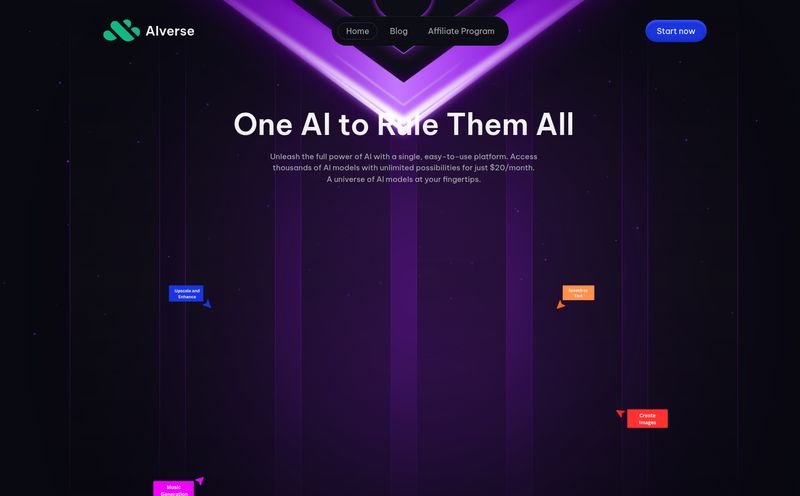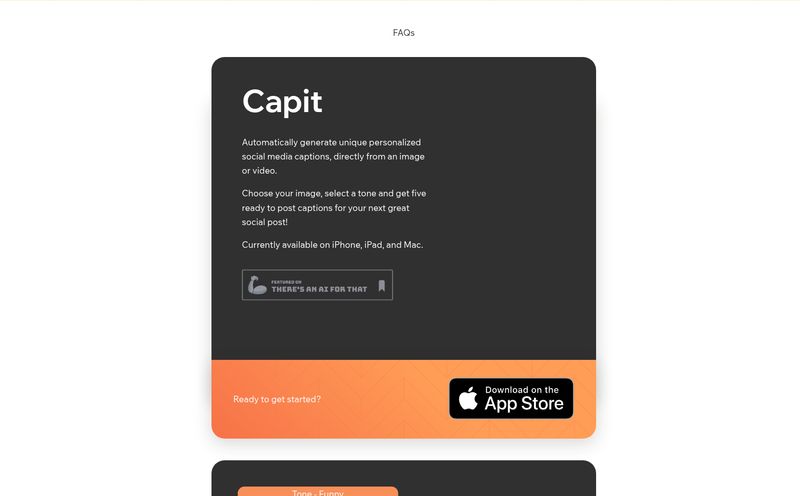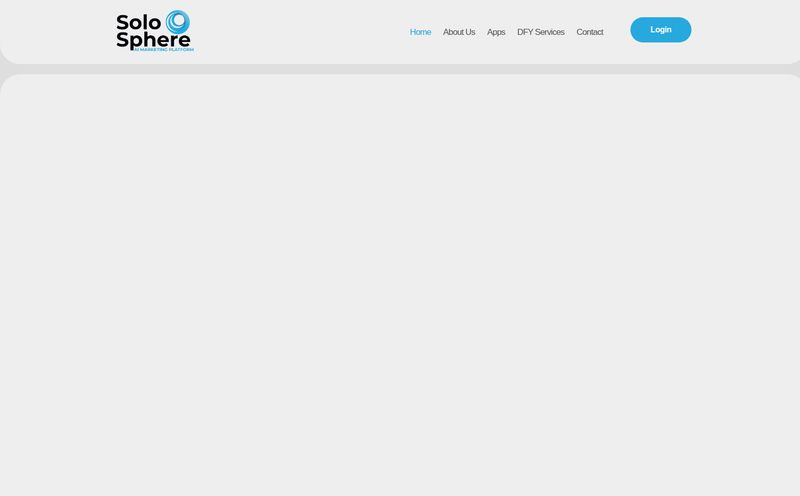If you're serious about learning a new language, you've probably crossed paths with Anki. It's this brilliant, slightly nerdy, and ridiculously effective flashcard program built on spaced repetition (SRS). It works. The science is solid. But, and this is a massive but, creating good Anki cards is an absolute soul-crushing grind.
I can't tell you how many Sunday evenings I've lost, hunched over my laptop, meticulously crafting flashcards. Find a good sentence. Find the translation. Find a native audio clip (the holy grail!). Stitch it all together. Repeat. A hundred times. It's the digital equivalent of digging a ditch. You know the gold is at the end, but the process... ugh.
So when I stumbled upon a tool called AI4ANKI that promised to do all of that in seconds, my inner skeptic and my hopeful language-learner self had a little battle. Seconds? Really? It claims to be the fastest way to create language flashcards with high-quality audio. So, I jumped in to see if it was just another piece of overhyped AI vaporware or the real deal.
So What Exactly Is AI4ANKI?
Think of AI4ANKI as your personal flashcard-making assistant. An intern who works 24/7, speaks multiple languages, and never complains. At its core, it's a web-based tool that uses artificial intelligence to generate complete Anki sentence decks for you. You pick your target language, tell it your rough proficiency level (like A2 beginner or B1 intermediate), and... that's pretty much it. You click a button, and it spits out a ready-to-import file for Anki, complete with sentences and, crucially, text-to-speech audio for each one.
This isn't just about single vocabulary words. We're talking about sentence mining on autopilot. For those unfamiliar, sentence mining is the idea that learning words in the context of a full sentence is way more effective. It's a method popularized by language learning giants like Steve Kaufmann. AI4ANKI basically automates that entire, tedious process.

Visit AI4ANKI
The Time-Suck Problem Anki Users Know All Too Well
I have a love-hate relationship with Anki. I love the results it gives me. My Japanese vocabulary grew faster with Anki than with any other method. But I hated the setup. The time investment upfront is no joke. Some purists in the language community will tell you that the act of making the card is part of the learning process. And, sure, I get that. To a point.
But there's a point of diminishing returns. After the 50th card, I'm not learning anymore; I'm just doing data entry. It's a major barrier to entry and a big reason why many people give up on Anki before they see the real benefits. It's the classic struggle between an effective tool and its user-friendliness. AI4ANKI waltzes right into the middle of that struggle and offers a truce.
How AI4ANKI Actually Changes The Game
The biggest, most obvious win here is time. The claim of saving "hours every month" isn't an exaggeration. What would take me an entire evening now takes less than the time it takes to brew a cup of coffee. This is huge. It means more time for actual learning—speaking, listening, reading—and less time being an admin for your own education.
But the second magic ingredient is the audio. Finding clear, native audio for your sentences is a nightmare. You're either ripping it from shows (legally questionable and time-consuming) or using something like Forvo and hoping they have your exact sentence (they won't). The AI-generated audio from AI4ANKI is surprisingly good. It's clear, the pronunciation is solid, and it's attached to every single card without you lifting a finger. This transforms a simple reading-based flashcard into a powerful listening comprehension tool.
A Quick Look at the Features
AI-Powered Sentence Generation
The core of the machine. The AI is trained to create sentences that are appropriate for different learning levels, based on the Common European Framework of Reference for Languages (CEFR). So an A1 deck will have simple stuff like "The cat is big," while a B2 deck might include more complex clauses and vocabulary. It's not perfect, but it's a fantastic starting point.
The Magic of Instant Audio
I touched on this already, but it's worth repeating. The text-to-speech (TTS) technology has come a long way from the robotic Stephen Hawking voice of the 90s. The voices are natural-sounding and available across their supported languages. For nailing pronunciation and training your ear, this feature alone is almost worth the price of admission.
Let's Talk Money: AI4ANKI Pricing
Okay, so it’s not free. But the pricing seems pretty reasonable, especially when you weigh it against the time you're getting back. They have a few tiers, which I've broken down here.
| Plan | Price (Monthly) | Sentences per Month | Best For |
|---|---|---|---|
| Basic | $4 | 400 | Casual learners |
| Pro | $12 | 1,500 | Serious self-studiers |
| Tutor | $50 | 10,000 | Language tutors/schools |
My take? The $4 Basic plan is a no-brainer to try out. 400 sentences is more than enough to get you started and see if you like the workflow. That's about 13 new sentences a day, which is a very sustainable pace. For me, that's less than a latte, and it buys back hours of my life. Seems like a fair trade.
The Good, The Bad, and The AI-Generated
No tool is perfect. Let's get into the nitty-gritty.
What I Absolutely Love
The speed is intoxicating. The sheer joy of having a full, high-quality deck ready in under a minute cannot be overstated. It makes me want to use Anki more because the biggest hurdle has been removed. The multi-language support is great, and the interface is clean and simple. No fluff. It does one job, and it does it well.
Where It Could Be Better
First, the big one: there are no refunds. This is stated on their site, and it's a policy I'm not a huge fan of. It puts all the risk on the consumer, so I'd definitely start with the cheapest monthly plan before committing to anything more. Second, the content is AI-generated. While it's very good, it's not a human. You might get a sentence that's grammatically correct but sounds a little... odd or unnatural. It's rare in my testing but its possible. And finally, I'd say its main value is for that A1-B2 learner range. If you're a C1/C2 advanced learner needing hyper-specific vocabulary for, say, quantum physics in Korean, this probably isn't the tool for you. You'll still need to do that manually.
Answering Your Burning Questions
Is using AI like this cheating at language learning?
I'd say no. Is using a dictionary cheating? Or Google Translate to check a word? This is a tool to make the learning process more efficient. You still have to do the hard work of actually learning the cards in Anki. This just removes the tedious administrative part of the work.
Will the AI audio sound robotic and weird?
Honestly, I was impressed. It's not quite at the level of a human voice actor, but it's very, very close. For the purpose of learning pronunciation and getting listening practice, it's more than sufficient and worlds better than having no audio at all.
Who is this tool really for?
It's perfect for beginner to upper-intermediate learners (A1-B2) who use Anki and value their time. It's also an incredible resource for language tutors who need to create materials for their students quickly.
Is it easy to get the decks into Anki?
Yes, incredibly easy. It generates a `.apkg` file, which is the standard Anki deck package. You just download it and double-click it. Anki handles the rest automatically.
What if the AI generates a weird or incorrect sentence?
It can happen. The beauty of Anki is that every card is editable. If you spot a mistake or a sentence that feels off, you can quickly edit or delete that specific card within Anki itself. You have full control after the deck is imported.
Seriously, no refunds?
According to their website, that seems to be the policy. It's a bit of a bummer. My strong advice is to start with the lowest-cost monthly plan to make sure it fits your learning style before considering a longer-term subscription.
Final Thoughts: Is AI4ANKI a Must-Have?
After spending some quality time with AI4ANKI, I'm moving it from the "skeptical" column to the "genuinely useful" column. It's not a magic pill that will make you fluent overnight, but it's a powerful catalyst. It removes the single biggest point of friction in using one of the most effective language learning tools out there.
If you're someone who has tried and failed to get into a consistent Anki habit because of the time commitment of making cards, this could be the thing that finally makes it click for you. For the price of a coffee, you can buy back your Sunday evenings.
In my book, that's a pretty fantastic deal.



